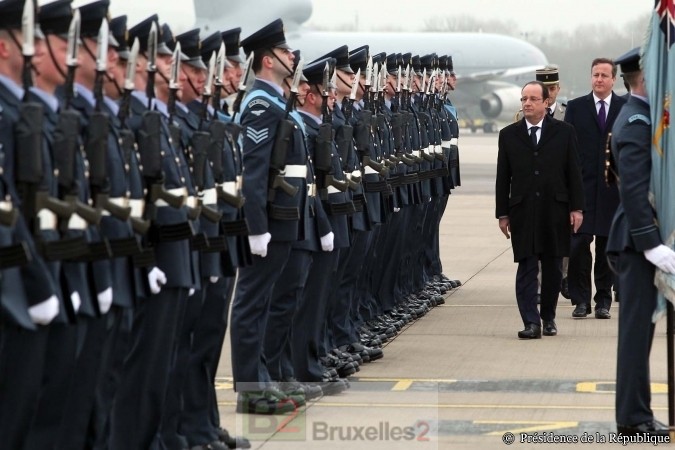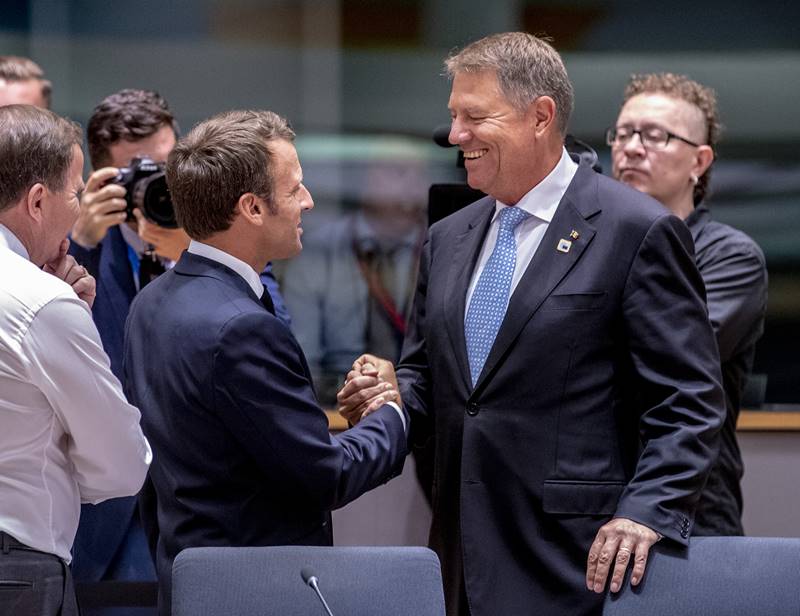Between French and British: a cousin, not a couple

(BRUSSELS2) Once again, a French President and a British Prime Minister came together on Friday to seek the celebration of the existence of a Franco-British "couple" which exists only in spirit, not in facts. We could also rather speak of a Franco-British "kinship" than of a "couple". We meet on various occasions, we love to have a drink or get excited about a good rugby match, or even go on vacation at some point. But that's all. No question of living together. In political terms, this translates into a summit from time to time, the signing of an industrial contract, "opportunity" convergences that only last for the moment of this opportunity.
A real cordial understanding
Historical and psychological proximity...
However, there are a number of undeniable convergences between the French and the British, both historically and psychologically. First of all, there is the trace of history - with the presence of an ancient empire -; a certain impression of grandeur (past, more present among the British, than the French moreover, more realistic about their own capacity); a certain propensity to say "I" instead of us; to want to compete. The Six Nations tournament is thus not as anecdotal as that. We like, every year, to confront each other, to show our muscles, among ourselves, but also to others. Two "great" nations meet.
Meaning of action
Then on the military level, the two countries share a certain "habit" of military "things". The army and defense are part of a kind of national atavism, which does not cause huge differences within political parties. When the government (in Great Britain), the President of the Republic (in France) decide to engage forces outside, the criticisms are not majority. Overseas intervention is a given of their international policy. The Minister of Defense - even if he is not often a leading figure - has a notable role within the government (which is only slightly the case in other European countries). The understanding between the two armies is really cordial because, each on both sides of the Channel, shares the same sense of action.
Convergence of views
This proximity translates into concrete actions whether on interventions or in international organizations, both politically and economically. Paris and London met on the intervention in Libya and shared, at least at the beginning, the desire to establish a "no fly zone" in Syria. The two countries, which sit on the UN Security Council, have a common strategy within NATO. They defend nuclear power, a reduction in the NATO apparatus (which jeopardizes certain states which have made the organization the alpha and omega of their defence), etc.
Budget weight
Finally, even if their budget is down, France and the United Kingdom share a clear desire (at least so far) to preserve a general range of military tools (land, air, sea, intelligence). Their "defense" budget is roughly the same (between 30 and 40 billion euros per year). And, even if it is falling, they still represent between them a good third of European defense budgets; an even clearer dominance when comparing investments or research.
Europe ... as a divider
But all this is not enough to characterize a couple and even less to influence Defense Europe. We had already written about it on this blog the day after the Lancaster House agreements. The British don't want to hear about Defense Europe (or even just Europe)! Up close, from afar, from the side... Even more today than yesterday. From top to bottom of the ladder, the instruction was passed directly by David Cameron's cabinet to all the ministries, in particular the Ministry of Defense and that of Foreign Affairs, and this in writing. Defense Europe is "NO".
A relentless logic
The return of "10 Downing Street" is simple, and follows an implacable logic, in three points.
1° The security of the United Kingdom - and of Europe - passes through NATO.
2° Europe can complement this action through humanitarian or development.
3° The EU does not have to have its own capabilities or its own defense projects. Member States must keep control.
From this line of conduct stems another, more discreet instruction: do everything to block what could resemble, from near or far, a European integration of Defence. We saw the exit of David Cameron at the last European summit. It looked like an electoral harangue (denouncing a project that had never been put on the table: the European army) and allowed the Conservative Prime Minister to come out of it obviously a winner (since the project did not exist). But it also had a more discreet objective, to serve as a marker for the Europeans, to prevent them from being too spirited. The objective has been doubly achieved.
Down to the smallest detail
This fear of seeing a "blue flag" dress a British soldier is so strong that in the communication of the British army, the blue flag is often underestimated. So most often we will focus on the bilateral or the international. This is the case with participation in the EU's anti-piracy operation (EUNAVFOR), which can be summed up as an "international" effort against piracy. The recent decoration of a British soldier by the British Chief of Staff bears witness to this (see here). It is necessary to look in the official communication of the MOD (the British Ministry of Defence) that it is on European ground - that of the EUTM Mali operation, training the Malian army - that the decorated soldier officiated.
A regular blockage
London is not satisfied with "communication". On a daily basis, the British put their veto as soon as they can. They block any additional budget to the European Defense Agency (even the simple consideration of inflation). Ditto for the European HQ project which had nevertheless received everyone's approval. For each of the decisions, even the most ordinary, concerning the CSDP (the common security and defense policy) or foreign policy, they ask for a consultation of their parliament, and therefore a short delay before approving the decision. They also blocked the project of a stronger representation of the European Union at the international diplomatic level (UN, etc.)
Occupy key positions
Finally, the United Kingdom is trying to be present in a number of key positions in the European Diplomatic Service or the CSDP. London has thus presented - or presents - to almost all the positions of the candidates. Often excellent profiles from elsewhere who have real skills and deserve to be there. A way like any other to occupy the ground and to seize the machine from the inside. In all the European missions that have a strategic interest (Horn of Africa, Libya, etc.), the British are present, not automatically at the level of sighted posts (head of mission) but often in a position of influence (adviser policy, etc.) or with very "concrete" feedback (responsible for contracts or calls for tenders, etc.). It will therefore be interesting to observe what positions they will occupy in the future operation EUFOR RCA Bangui (even if London has publicly stated that it does not want to hire men on the ground).
The limits of British brilliance
A tactic that has reached a plateau
This blocking tactic has so far met with some success. But today we see its limits. And it shouldn't be overstated. Without being totally isolated, the British model is no longer really popular today in Europe. Because each country feels that the national interest is elsewhere. In terms of defence, it is more interesting for a State to have another strategy. 1) Or work bilaterally with his/her neighbors (Czechs with Slovaks, Baltics and Nordics, Latins, etc.). 2) Or, if you value transatlantic relations, establish ties directly with the United States, without going through London. London's privileged transatlantic link with Washington is thus losing its value. 3) Or, when it is impossible to do otherwise, or when there is an incentive (financial or industrial), to work as Europeans. Often all three at the same time. The persistent British blockage to certain fairly concrete European projects, the lack of financial solidarity as a London policy, is beginning to seriously irritate. Especially since this blockage is really ideological, without valid reason.
British power pales
Everyone also realizes that British "power" is beginning to fade. In recent European operations, whether in Georgia (observation mission), in Kosovo (rule of law mission), in Chad (military land operation), in the Indian Ocean (anti-piracy) and tomorrow in Central African Republic (land military operation), British participation was often modest, and never essential. In other words, contrary to the adage often repeated by certain experts, we can function very well at European level without the British military. It's not only possible. But that's the reality. To this must be added a loss of operationality. Once the withdrawal from Afghanistan has been made, the British army will not really be present on much external ground (apart from its land grips: Falklands, Gibraltar, Cyprus...). As for the adage of action of the British, it took a "hit" during the "no" of the parliament to an intervention in Syria. That day, the United Kingdom joined the common European mortals, the principle is non-intervention.
One couple, one couple
Finally at the European level, even in terms of defence, there is only one "pair" left. Despite all the differences and divergences between France and Germany, lasting defense cooperation can be built. The giant Airbus amply demonstrates this today as the "small" EATC today (European Air Transport Command). And even if certain projects - such as the Franco-German Brigade or the Eurocorps - have not really proven their success, these appearances should not be trusted.
- At the military level, on a number of operations - such as the anti-piracy operation, the training mission of the Malian army and even the Central African Republic - French and Germans can find (and find) common operating methods, even if they are not simultaneous.
- On the political level, the coming to power of the SPD and certain "reunions" within the CDU allow, more than ever, between Paris and Berlin, more than acquaintances, the reality of a common course.
- At the industrial level, new projects still have to be found. We will no doubt see it during the Franco-German Council of Ministers which is being held in Paris on 19 February.
As always, between the two countries, it will not be easy, even very difficult, because there are real differences. But it is precisely this difficulty that makes joint projects sustainable and this "couple" so irreplaceable. Because around a Franco-German "couple", many Europeans can find themselves. Around a Franco-British "kinship", there are not many people, it is the greatest weakness of this meeting...
Read also: David Cameron sounds the (heroic) charge...
About the Club: Drones, Missiles, Pilots…. Grain to grind in Franco-British cooperation
To be continued: English gentlemen, shoot first. And... are you shooting?

